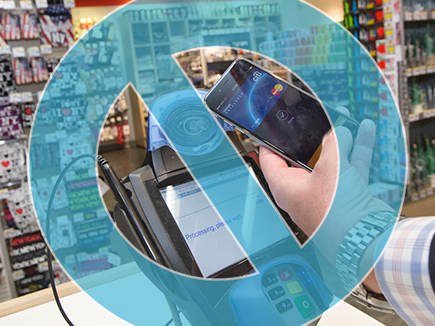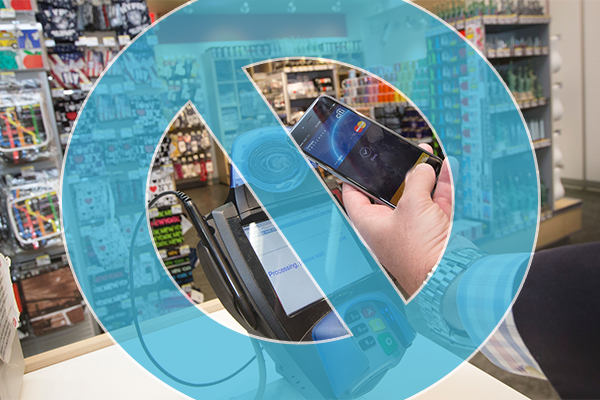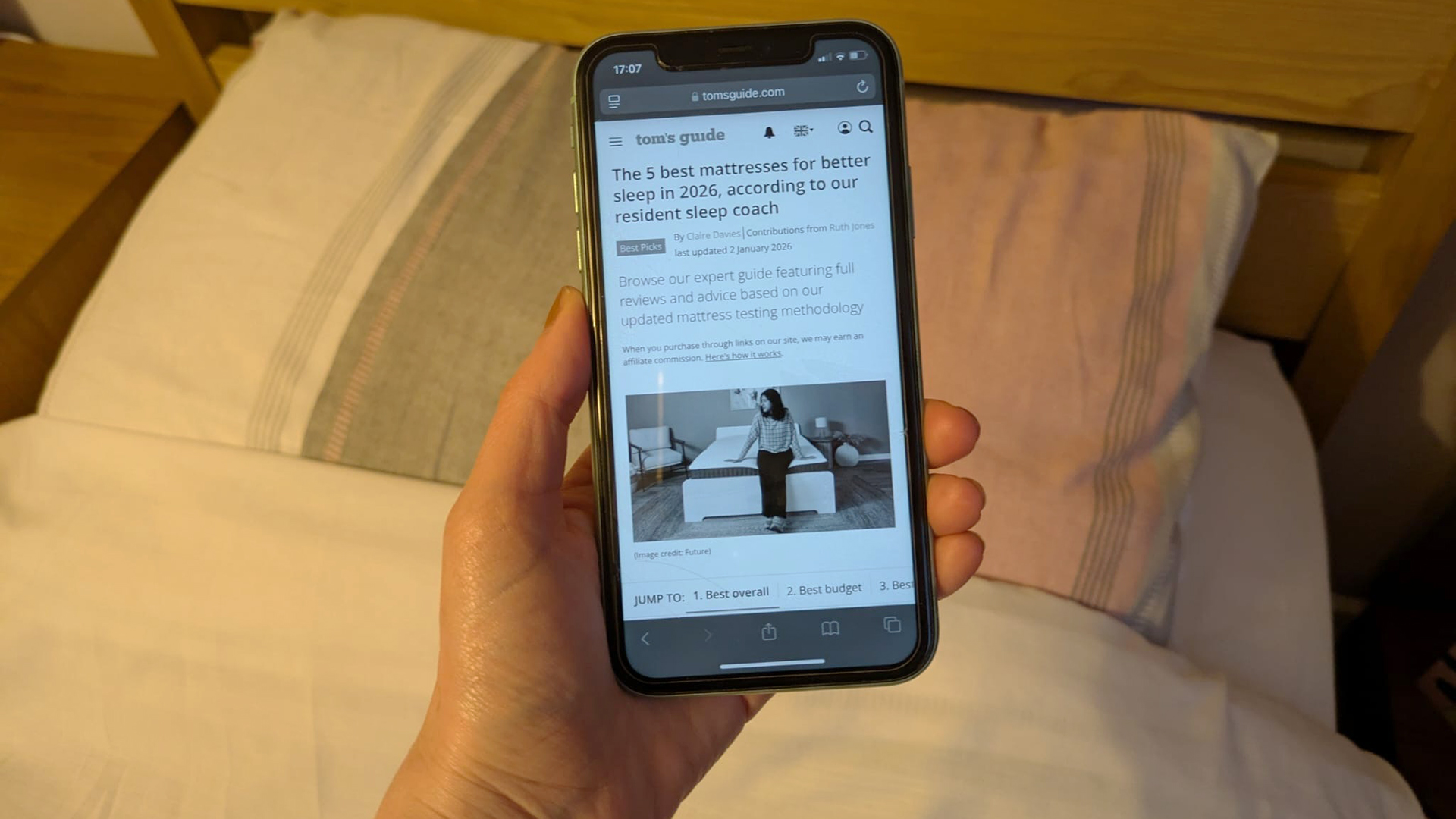Blocking Apple Pay is Anti-Consumer (Op-Ed)
In an effort to avoid paying credit card fees, companies using CurrentC instead of Apple Pay are doing their customers a disservice.

Here at Tom’s Guide our expert editors are committed to bringing you the best news, reviews and guides to help you stay informed and ahead of the curve!
You are now subscribed
Your newsletter sign-up was successful
Want to add more newsletters?

Daily (Mon-Sun)
Tom's Guide Daily
Sign up to get the latest updates on all of your favorite content! From cutting-edge tech news and the hottest streaming buzz to unbeatable deals on the best products and in-depth reviews, we’ve got you covered.

Weekly on Thursday
Tom's AI Guide
Be AI savvy with your weekly newsletter summing up all the biggest AI news you need to know. Plus, analysis from our AI editor and tips on how to use the latest AI tools!

Weekly on Friday
Tom's iGuide
Unlock the vast world of Apple news straight to your inbox. With coverage on everything from exciting product launches to essential software updates, this is your go-to source for the latest updates on all the best Apple content.

Weekly on Monday
Tom's Streaming Guide
Our weekly newsletter is expertly crafted to immerse you in the world of streaming. Stay updated on the latest releases and our top recommendations across your favorite streaming platforms.
Join the club
Get full access to premium articles, exclusive features and a growing list of member rewards.

It’s hard to feel sorry for a company that just posted $42 billion in revenue during the most recent quarter. And I don't feel sorry for Apple. But I do feel bad that shoppers will be forced to use an alternative to Apple Pay that looks a lot more cumbersome.
Over the weekend, CVS and Rite Aid decided to turn off NFC payments in their stores, which ostensibly allowed Apple Pay to work in their locations. These same payment terminals also supported Google Wallet, although that solution for Android phones never took off. Why did CVS and Rite Aid pull the plug? Because they'll be rolling out a rival payment system in early 2015 called CurrentC, backed by a consortium called Merchant Customer Exchange (MCX).
Too bad CurrentC looks as convenient as writing a check. Actually, it's worse.
Based on a report from TechCrunch, paying with CurrentC will involve multiple steps. First, you unlock your phone, then open the CurrentC app, then open a code scanner to scan a QR code displayed on the cashier's screen.
MORE: 15 Best iOS 8 Apps
With Apple Pay, you simply hold your phone up to an NFC-equipped payment terminal, then press your finger on your iPhone 6 or iPhone 6 Plus Touch ID sensor. You don't even need to unlock your phone. It's no contest.

CurrentC isn't entirely awful. The payment system will integrate with retailers' loyalty card programs, offering shoppers' discounts and other rewards. Ultimately, though, Walmart, Best Buy, Rite Aid, ExxonMobil and other heavy hitters are embracing MCX for two keys reasons: the ability to sidestep credit card processing fees and gather precious data on its shoppers.
Get instant access to breaking news, the hottest reviews, great deals and helpful tips.
CurrentC will tap your debit account directly instead of a credit card, which will allow retailers to wring more profit out of each sale. And because retailers will be able to monitor your shopping habits (although you can decide not to share transactional data), they'll be better able to target you with promotions. TechCrunch reports that CurrentC will even track health and medical data, though it's not clear what that means.
The bottom line is that blocking Apple Pay is anti-consumer. Shoppers should be able to decide what mobile payment solution they want to use. And while stores argue they should be able to choose which mobile payment solution to back, not allowing Apple Pay to be part of the mix is bad for competition.
As a result of Rite Aid's and CVS' actions, both Android and Apple users have banded together on Reddit in an attempt to boycott those businesses that block Apple Pay. That tells me something. When was the last time Android and iPhone owners agreed on anything?
MORE: Apple Pay: Where You Can (and Can't) Use It
Blocking Apple pay is also bad for the industry. It will slow the momentum of the first successful mobile payment solution just as it's starting to resonate with shoppers. But it won't stop Apple Pay. In fact, more and more consumers are going to be exposed to it every day without having to leave the house. There are a growing number of Apple Pay shopping apps that let you check out with a tap of your finger. This includes Target, which is supporting CurrentC for in-store payments. The more people who are exposed to Apple Pay, the more folks are going to ask for it elsewhere.
Rite Aid and CVS likely acted to block Apple Pay because of their business agreement with MCX. But these and other retailers will regret their decision not to be more inclusive of a solution that shoppers are already embracing. Why wait until 2015 for something that looks awkward when something more elegant works today?
If the Merchant Customer Exchange truly stands behind CurrentC, it should let it compete based on its own merits, not by preventing its main rival from even playing the game.
Mark Spoonauer is the editor in chief of Tom's Guide. Follow him at @mspoonauer. Follow Tom's Guide at @tomsguide, on Facebook and on Google+.
Mark Spoonauer is the global editor in chief of Tom's Guide and has covered technology for over 20 years. In addition to overseeing the direction of Tom's Guide, Mark specializes in covering all things mobile, having reviewed dozens of smartphones and other gadgets. He has spoken at key industry events and appears regularly on TV to discuss the latest trends, including Cheddar, Fox Business and other outlets. Mark was previously editor in chief of Laptop Mag, and his work has appeared in Wired, Popular Science and Inc. Follow him on Twitter at @mspoonauer.
-
turkey3_scratch There is no reason Apple should assume their phones are the standardized way of payment. Honestly, Apple wants to take over the US way of paying. They assume that no one has Android, so stores should explicitly use Apple pay. What a load of crap. What we do need is a standard for all phones.Reply -
burkhartmj Reply14461966 said:There is no reason Apple should assume their phones are the standardized way of payment. Honestly, Apple wants to take over the US way of paying. They assume that no one has Android, so stores should explicitly use Apple pay. What a load of crap. What we do need is a standard for all phones.
This article overly harps on Apple Pay, but it's identical to Google Wallet. Some of the deep backend stuff is different, like how payments are processed through Apple, but it uses the exact same hardware and protocols. Anything that can use Apple Pay can use Google Wallet or Softcard. Whatever Apple wants in this space, it helps everyone who uses NFC payment systems. -
Miharu Why fair play?Reply
Seriously! Apple block NFC on their phone for kept the control of payment.
Easy to use perhaps but what if I don't want to use Apple Pay?
I'm happy to see some companies against this insanity and show they can actually do the same as Apple do. -
glasssplinter ReplyThere is no reason Apple should assume their phones are the standardized way of payment. Honestly, Apple wants to take over the US way of paying. They assume that no one has Android, so stores should explicitly use Apple pay. What a load of crap. What we do need is a standard for all phones.
I've never understood this either. Who walks into a store and complains about the payment types because they don't work with the latest fad? As long as they take cash, check, or a major credit/debit card company then deal with it. I've had NFC payment capability for a few years now and have no desire to use it and don't expect retailers to spend thousands to upgrade perfectly functioning hardware so I can tap my stupid phone on a pin pad. Just because crapple puts something out there doesn't mean it's the standard, it's just the opposite. -
none12345 Dunno how you can say that apple pay is this mecca of innovation. or that its successful. It only just came out, the jury is still in on whether or not its successful.Reply
So far, at my business, not a single person has tried to use apple pay. Our terminals support NFC.
As a small business owner, i just want something that erases credit card fees. Apple pay does NOTHING for me. I still get charged for every swipe of the credit card. Or in this case i get charged for a swipe of the phone(which on the back end is no different then if you had pulled our your credit card and swiped it)
All apple pay does is give apple a piece of the pie. Sure they say they dont charge you additional fees, and they get their money from the banks processing their transactions. However, if people start using it, and lots of transactions go through apple pay. credit card processing fees will increase, the apple profit will just be passed on to small businesses.
A credit card swipe costs the credit card companies virtually nothing, a tiny fraction of a tiny fraction of a tiny fraction of a penny to process that transaction. Yet they charge 25-30cents or so on each swipe, and they charge a percentage of the gross sale 1-2%. If your card is declined and the retailer swipes it again, they get charged another swipe fee. Even if its declined again. Hell swipe your card on a small sale, say a $1-2, and ive likely lost money selling you that item because of the swipe fee.
1-2% Sounds small but take a $10 item. Credit card fee will be 45 cents or so. Ends up being 4.5% ish of that $10. But wait thats not the real percentage either. Costs $7 to buy the item. So really you made $3 before the credit card fees. Now the credit card has eaten up 15% of the profit on that item, leaving you with 2.55. But wait thers more, one still needs to count employee wages, utilities, rent, taxes, etc. Makes the credit card fees even larger compared to the profit.
But wait thats not all either. Dont forget the 25% interst they charge the consumer as well. And those $35 over the limit fees for every sale. Dont forget the reorderign of charges so largest charges are processed first so you get dinged for $35 10 time sin a row for 10 $1 sales. (ive seen this happen to friends, one guy had 15 charges from redbox a few years ago, where the credit card had tacked on a $35 over the limit fee on every single one.)
-
kojenku I don't see any problem with the move. Why would CVS, RiteAid and other stores to be compliant with Apple Pay? Apple needs to work to convince these stores in the first place. I personally do not trust this types of business as it is flaky and downright horrible. I would rather buy Apple stocks than accepting its business practice. There are always people rushing to buy whatever ridiculous idea Apple is boasting, so the safest is Apple stocks, not their products.Reply -
hitman40 Did you guys even read the article? No one is forcing you to use Apple Pay for mobile payments, but they ARE forcing you to use CurrenC. It's a stupid decision. The world has finally reached the era where the idea of "console exclusives" have arrived to mobile payments.Reply -
Redraidr12 I like how everyone reads this article and thinks it's another Apple vs. Google debate...Reply
The 2 or 3 times I've used Apple Pay so far, show me how convenient it is for ME (not to mention supposedly safer). Google Wallet, I believe, is very similar. This is what the article is talking about... the debate about fees is moot; this is a consumer article, not a business article. -
marthisdil Reply1-2% Sounds small but take a $10 item. Credit card fee will be 45 cents or so. Ends up being 4.5% ish of that $10. But wait thats not the real percentage either. Costs $7 to buy the item
If you're marking up a $7 wholesale item to only $10, perhaps you should find better stuff to sell with a better markup. -
HyNrgy it's simple.....Reply
Apple came out with something and wants everyone else conform, modify, or adjust to THEIR system/method. Generally when something new comes out like this the NEW thing conforms or makes it compatible with others.
I would support Apple Pay if Apple paid for every business to use it and all the equipment and fees that go alone with it but I don't think they will do that
 Club Benefits
Club Benefits











